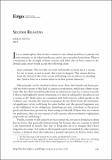Selfish Reasons
Author(s)
Setiya, Kieran
DownloadSetiya_Selfish reasons.pdf (166.8Kb)
PUBLISHER_CC
Publisher with Creative Commons License
Creative Commons Attribution
Terms of use
Metadata
Show full item recordAbstract
It is a commonplace that we have reason to care about ourselves, to pursue our own interests, to do what benefits us, and to save ourselves from harm. What is contentious is the strength of these reasons, and what else we have reason to do. Details aside, most would accept the following claim:
Self-Concern: The fact that an event will benefit or harm me is a reason for me to want, or not to want, that event to happen. This reason derives from the effects of the event on my well-being, not its effects on anything else. And its force as a reason turns on its first person character.
This principle can be clarified in three ways. First, that benefit and harm provide me with reasons of this kind is a generic proposition, which may admit exceptions. The fact that I would benefit from an immoral act may be a reason to prefer it that is outweighed by moral objections, or it may be silenced by morality, so not a reason at all.[1] Both views are consistent with Self-Concern, which speaks to the ordinary case. Second, the reasons in question do not derive from the instrumental significance of my well-being for some further end: the general happiness, say, or the fulfillment of my obligations. Benefiting me may contribute to the greater good, and harm may prevent me from acting as I should. If these facts are reasons for preference, they are not reasons of self-concern, whose normative explanation stops with my well-being.
Date issued
2015-07Department
Massachusetts Institute of Technology. Department of Linguistics and PhilosophyJournal
Ergo: an Open Access Journal of Philosophy
Publisher
Michigan Publishing
Citation
Setiya, Kieran. “Selfish Reasons.” Ergo: an Open Access Journal of Philosophy vol. 2, no. 18, July 2015, pp. 445-475.
Version: Final published version
ISSN
2330-4014